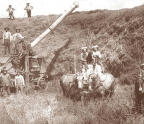Embrace Broody Hens

MANY chicken keepers get frustrated when a hen persistently sits on her eggs, but I embrace her “broodiness,” because it makes my job much easier. Why spend the time, trouble, and money buying fertilized eggs, babying them in an incubator, and hand-raising chicks when I can let one of my hens do all the work for me?
When I first became interested in getting chicks the old-fashioned way, I was surprised to find that helpful advice could be hard to come by. Perhaps this is because farmers have culled broody hens for centuries. After all, broody hens don’t lay eggs, and that costs farmers money. Because of this culling practice, modern hens aren’t well wired to hatch eggs.
In general, consider heritage breeds if you’re selecting for broodiness. Heritage breeds have a greater tendency to go broody, because they haven’t had the trait bred out of them to the same degree as modern hybrids. Still, you’re not guaranteed a broody hen from a heritage breed, or a non-setter (a hen that won’t go broody)
You’re reading a preview, subscribe to read more.
Start your free 30 days





